Have you ever wondered about the German Spitz dog breed and what makes them so special?
Well, look no further as this discussion aims to provide you with comprehensive information and characteristics of this versatile and lively breed.
From their origin and historical significance to their energetic personality traits and grooming needs, there is much to uncover about these adorable dogs.
So, let's delve into the world of German Spitz and discover what makes them stand out from the crowd.
Key Takeaways
- German Spitz dogs are small to medium-sized breeds originating from Germany and have a lifespan of 12-16 years.
- They have a variety of coat colors and a thick, fluffy double coat that requires regular grooming to prevent matting.
- German Spitz dogs are energetic and intelligent but can be stubborn, making early and consistent training important.
- When choosing a German Spitz, prioritize adoption from rescue organizations or reputable breeders who prioritize health and temperament.
Origin and Breed Group
The German Spitz, a small to medium-sized dog breed, originated in Germany and belongs to the Spitz breed group. It's one of the oldest dog breeds in Europe and was popular with royalty.
The breed was introduced to a wider audience through German visitors to the English court and is known by several names. German Spitz dogs are energetic and love to please their families. They've a high energy level and are wary of strangers, making them excellent watchdogs.
While they're intelligent, they can also be stubborn. Regular exercise and play sessions are important for their physical and mental well-being.
German Spitz dogs come in various coat colors and have a double coat that requires regular grooming to prevent matting.
Size and Weight Range
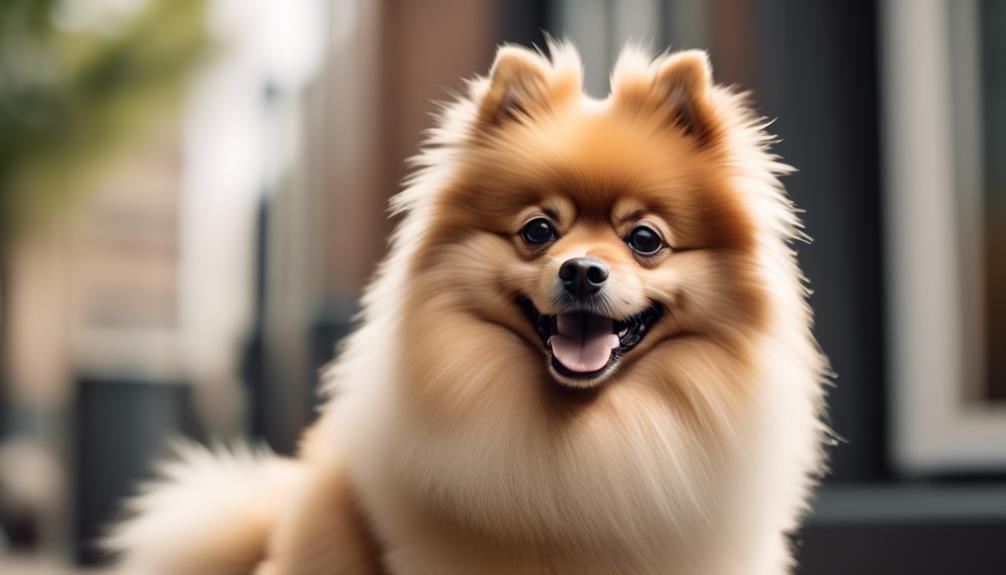
German Spitz dogs come in a range of sizes, from small to medium. The table below provides specific information on the size and weight range of the different varieties of German Spitz dogs:
| Variety | Size | Weight Range |
|---|---|---|
| Zwergspitz | Small | 7-11 pounds |
| Klein Spitz | Small-Medium | 11-22 pounds |
| Mittelspitz | Medium | 22-30 pounds |
The Zwergspitz, also known as the Pomeranian, is the smallest variety of German Spitz, weighing between 7 and 11 pounds. The Klein Spitz falls into the small to medium size category, weighing between 11 and 22 pounds. Lastly, the Mittelspitz is a medium-sized German Spitz, with a weight range of 22 to 30 pounds. It is important to consider the size and weight range when selecting a German Spitz, as it can impact the dog's suitability for different living arrangements and lifestyles.
Lifespan and Varieties

Moving on from discussing the size and weight range of the different varieties of German Spitz dogs, let's now explore their lifespan and the various types within this breed.
German Spitz dogs have a relatively long lifespan, typically living between 12 to 16 years.
Within the German Spitz breed, there are five main varieties: Zwergspitz (also known as Pomeranian), Klein Spitz, Mittelspitz, Großspitz, and Wolfsspitz.
The Zwergspitz is the smallest variety, weighing only 7 pounds, while the Großspitz is the largest, weighing about 30 pounds.
Each variety has its own distinct characteristics, including coat color, size, and temperament.
It's important for potential owners to understand these differences in order to choose the right German Spitz variety that suits their lifestyle and preferences.
Historical Significance

With a rich and storied past, the German Spitz breed has played a significant role in the history of dogs in Europe.
Here are some key points highlighting the historical significance of the German Spitz:
- Oldest Dog Breeds in Europe: The German Spitz is one of the oldest dog breeds in Europe, with a lineage dating back centuries.
- Royalty's Favorite: The breed was popular among royalty and aristocracy, who valued their beauty, intelligence, and companionship.
- Introduction to England: German visitors to the English court introduced the German Spitz to a wider audience, leading to its recognition and popularity outside of Germany.
The German Spitz's historical significance is a testament to its enduring qualities and charm. Its presence in European history showcases its adaptability, loyalty, and enduring appeal as a beloved companion.
Energetic Personality Traits
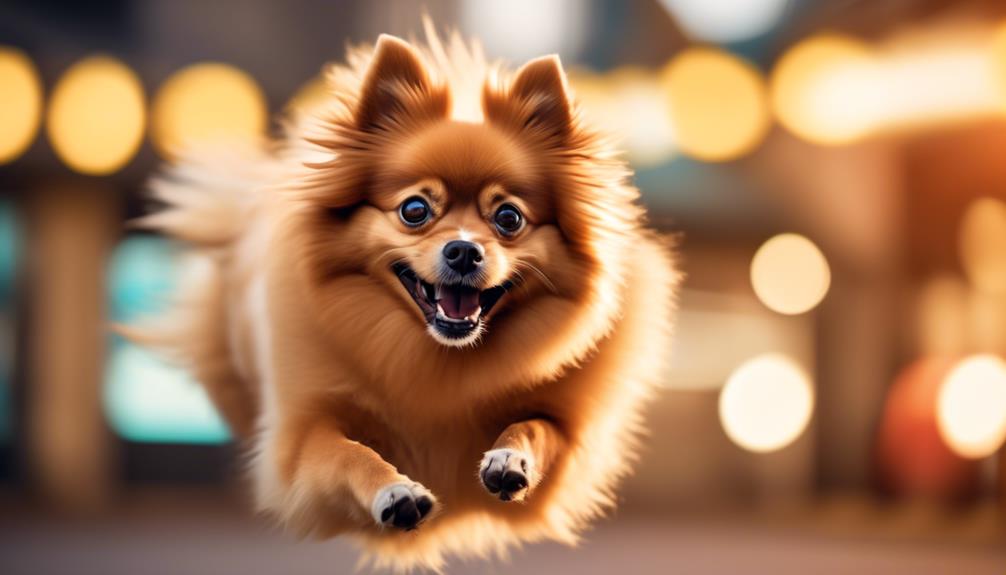
Having established the historical significance of the German Spitz breed, it's important to explore their energetic personality traits.
German Spitz dogs are known for their high energy levels and lively nature. They're always ready for playtime and love to engage in various activities. This breed is highly active, making it essential for owners to provide them with regular exercise and mental stimulation.
German Spitz dogs thrive on physical activities such as walks, runs, and interactive games. They've a natural curiosity and love to explore their surroundings.
Due to their energetic nature, German Spitz dogs are best suited for families who can keep up with their active lifestyle. It's important to note that proper training and consistent exercise are necessary to ensure a well-rounded and happy German Spitz companion.
Intelligence and Watchdog Abilities

German Spitz dogs possess high intelligence and natural watchdog abilities. They're known for their keen senses and alertness, making them excellent guardians for their families. Here are three key points about their intelligence and watchdog abilities:
- Quick Learners: German Spitz dogs are highly intelligent and have a knack for learning new commands and tricks. They're quick to pick up on cues and can be easily trained to perform various tasks, making them highly trainable and obedient.
- Alertness: With their sharp senses, German Spitz dogs have a natural instinct to be vigilant and attentive. They're always on the lookout for any potential threats or intruders, making them excellent watchdogs. Their alert nature ensures that they'll quickly alert their owners to any unusual activity or danger.
- Protective Nature: German Spitz dogs are known for their protective instincts towards their families. They're loyal and will go to great lengths to protect their loved ones if they sense any danger. This makes them not only excellent watchdogs but also reliable companions who'll always have their family's back.
Regular Veterinary Checkups
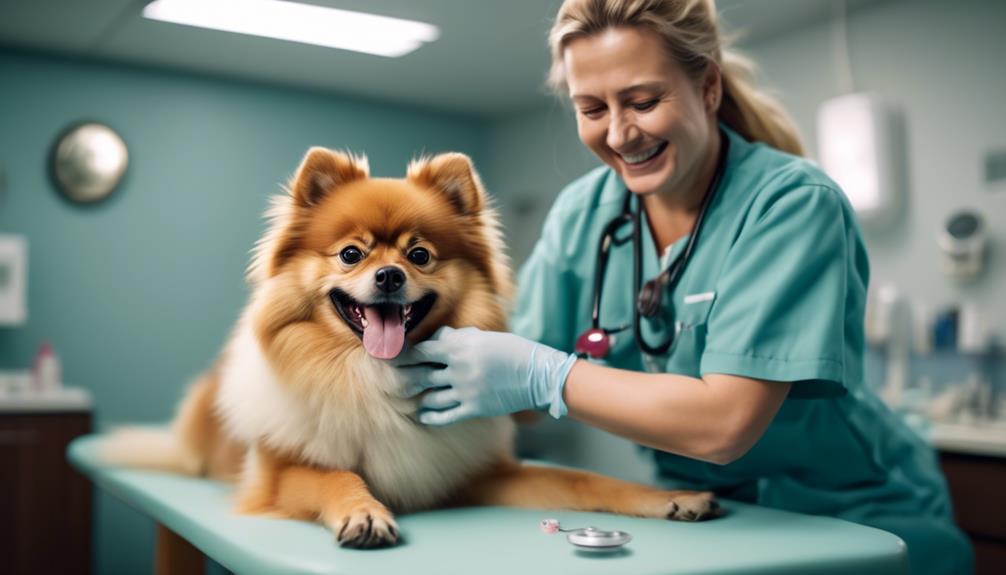
Regular veterinary checkups are an essential part of maintaining the health and well-being of German Spitz dogs. These checkups are crucial for early detection and prevention of health concerns.
German Spitz dogs are prone to certain health problems such as collapsing trachea, epilepsy, patellar luxation, and progressive retinal atrophy. By scheduling regular veterinary checkups, owners can ensure that any potential health issues are identified and addressed promptly.
In addition to checkups, proper care and attention should be given to exercise, grooming, and oral health. Regular exercise and play sessions, daily ear cleaning and nail trimming, along with a focus on maintaining oral health through teeth brushing, are all important aspects of caring for a German Spitz.
Common Health Problems
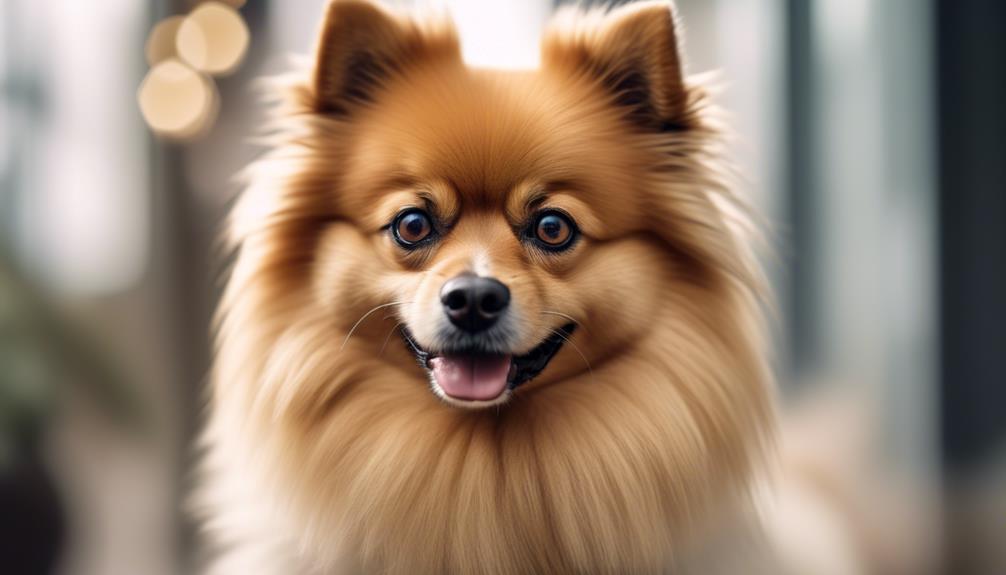
Common health problems can affect German Spitz dogs and require regular veterinary care. It's important for owners to be aware of these issues and take appropriate measures to ensure the well-being of their pets.
Here are some common health problems that German Spitz dogs may experience:
- Collapsing Trachea: This condition occurs when the trachea, or windpipe, weakens and narrows, making it difficult for the dog to breathe properly. It can cause coughing, wheezing, and exercise intolerance.
- Epilepsy: German Spitz dogs are prone to seizures, which can be caused by various factors such as genetics or underlying health conditions. Medication and management strategies can help control seizures and improve the dog's quality of life.
- Patellar Luxation: This is a condition where the kneecap slips out of place, causing pain and difficulty in walking. Regular exercise, weight management, and sometimes surgery may be necessary to address this issue.
Exercise and Play Requirements
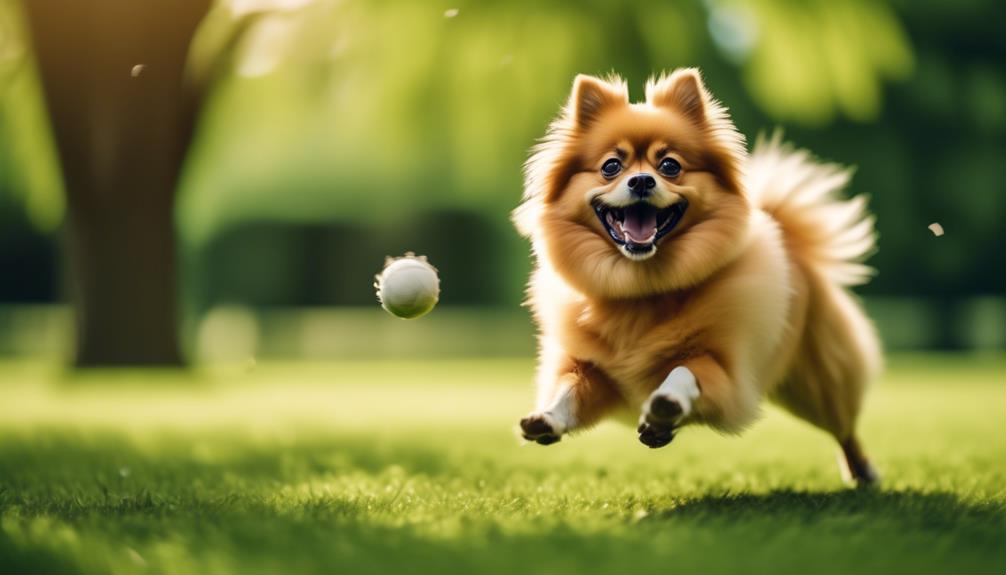
After addressing the common health problems that German Spitz dogs may experience, it's important to understand their exercise and play requirements to ensure their overall well-being.
German Spitz dogs are energetic and require regular exercise to prevent boredom and destructive behavior. They should be given daily walks or play sessions to meet their exercise needs.
These dogs also enjoy mental stimulation through interactive toys and games. Due to their alert nature, they make excellent watchdogs and can benefit from obedience training. However, it's important to start training early and be consistent, as they can be stubborn at times.
Engaging in activities such as agility or obedience trials can also be beneficial for their physical and mental development. Providing them with ample opportunities for exercise and play will help maintain their health and happiness.
Daily Care for Ears and Nails
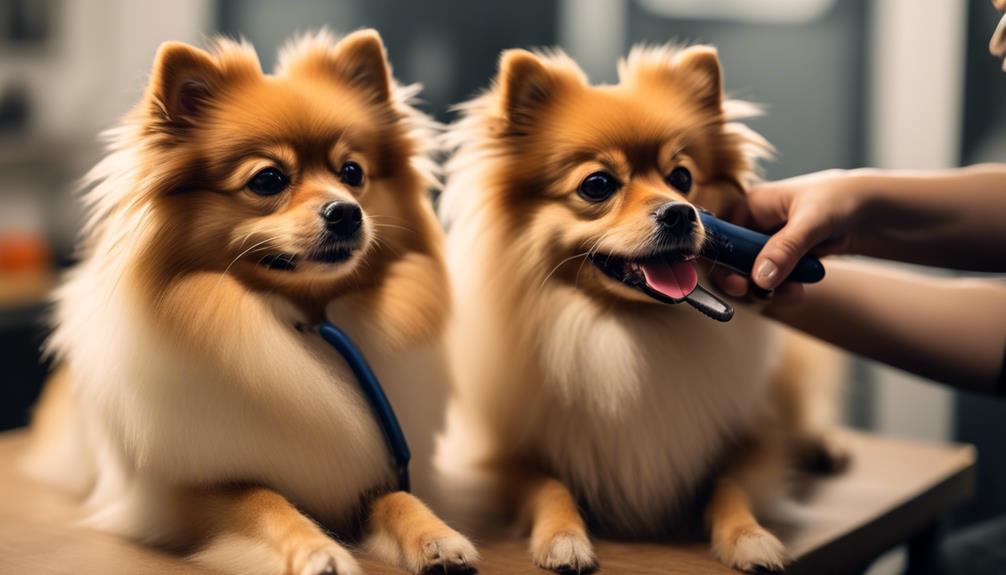
To ensure the well-being of your German Spitz, it's important to provide daily care for their ears and nails. Here are three essential steps to follow:
- Cleaning the ears: Regularly check your German Spitz's ears for any signs of infection, such as redness or a foul odor. Gently wipe the inner ear with a damp cloth or a veterinarian-recommended ear cleaner. Avoid using cotton swabs, as they can potentially damage the ear canal.
- Trimming the nails: Long nails can cause discomfort and even lead to injury. Trim your German Spitz's nails regularly using a dog nail clipper or grinder. Be cautious not to cut too close to the quick, which is the sensitive part of the nail. If you're unsure, consult a professional groomer or veterinarian for assistance.
- Monitoring and maintaining: Keep an eye on your German Spitz's ears and nails between grooming sessions. Look for any signs of infection, excessive wax buildup, or overgrown nails. If you notice any issues, seek veterinary attention promptly.
Importance of Oral Health

Continuing with the essential care for your German Spitz, it is crucial to recognize the importance of maintaining their oral health. Just like humans, dogs can develop dental problems that can lead to pain, discomfort, and even serious health issues if left untreated. Regular teeth brushing is the most effective way to prevent dental disease in your German Spitz. By incorporating a daily dental routine, you can help remove plaque and tartar buildup, reduce the risk of gum disease, and keep your dog's breath fresh. To emphasize the significance of oral health, let's take a look at the potential consequences of neglecting your German Spitz's dental care:
| Neglected Oral Health | Consequences |
|---|---|
| Bad breath | Unpleasant odor |
| Plaque and tartar buildup | Tooth decay, gum disease |
| Tooth loss | Difficulty eating, pain |
| Bacterial infection | Systemic health issues |
Proper Diet for Small Breeds

With their small stature and high energy levels, proper diet is crucial for the well-being of German Spitz dogs. To ensure optimal health, owners should consider the following when formulating their pet's diet:
- High-quality dog food: German Spitz dogs require a balanced diet that's rich in nutrients. Look for dog food specifically formulated for small breeds, as it will meet their unique nutritional needs.
- Portion control: Due to their small size, German Spitz dogs have smaller stomachs and may be prone to weight gain. It's important to feed them appropriate portion sizes to maintain a healthy weight.
- Regular feeding schedule: Establishing a consistent feeding routine will help regulate their metabolism and prevent overeating. Aim for two to three small meals per day.
Grooming and Coat Care Tips
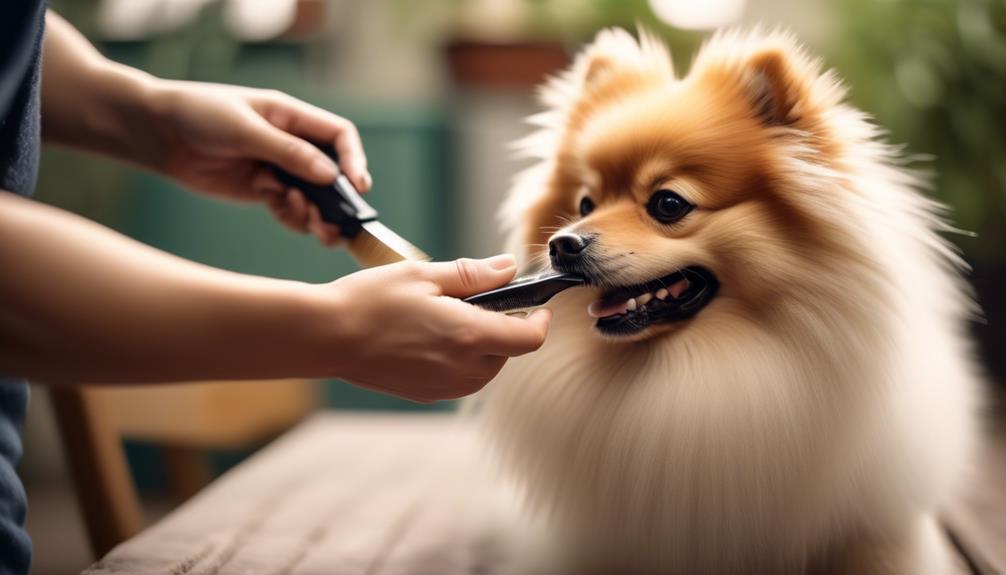
After addressing the proper diet for small breeds, it's important to shift our focus to the essential grooming and coat care tips for German Spitz dogs.
German Spitz dogs have a thick and fluffy double coat that requires regular brushing to prevent matting. Their coat comes in various colors, including black, brown, orange, wolf gray, and white. It's important to note that German Spitz dogs are better suited for colder weather than hot weather.
To maintain their well-being, regular grooming and coat care are essential. This includes brushing their coat at least once a week, trimming their nails regularly, and cleaning their ears on a daily basis. Additionally, it's important to avoid over-bathing them, as it can strip their coat of its natural oils.
Choosing a German Spitz

What factors should be considered when choosing a German Spitz? Here are three important things to keep in mind:
- Adoption or Purchase: It's highly recommended to prioritize adopting a German Spitz from rescue organizations or shelters. However, if you choose to purchase one, make sure to select a reputable breeder. Research the breeder's ethical practices and commitment to the dog's well-being. Reputable breeders prioritize health and temperament and conduct necessary health screenings.
- Adaptability and Exercise Needs: German Spitz can make great apartment dogs due to their small stature. They're suited for any type of household or family. However, they may have a tendency to be yappy. These dogs are energetic and alert, making them good watchdogs. They require moderate exercise and early, consistent training. Consider their energy level and exercise needs when choosing a breed.
- Coat Color and Grooming: German Spitz comes in various coat colors, including black, brown, orange, wolf gray, and white. They've a double coat with a long, straight overcoat and a short, woolly undercoat. Their thick and fluffy coat requires regular brushing to prevent matting. They're better suited for colder weather than hot weather. Proper grooming and coat care are essential for their well-being.
Adaptability and Exercise Needs

The German Spitz is a highly adaptable and energetic breed, making them well-suited for various types of households and families. They can make great apartment dogs due to their small stature, but they are also suited for larger homes and families. While they may have a tendency to be yappy, they are energetic and alert, which makes them excellent watchdogs. The German Spitz requires moderate exercise and early, consistent training to keep them mentally and physically stimulated. It is important to consider a dog's energy level and exercise needs when choosing a breed, and the German Spitz falls into the moderate exercise category. Below is a table summarizing the adaptability and exercise needs of the German Spitz:
| Adaptability | Exercise Needs |
|---|---|
| Highly adaptable | Moderate |
| Suited for various households | Energetic |
| Can make great apartment dogs | Requires regular exercise |
| May have a tendency to be yappy | Needs mental and physical stimulation |
Frequently Asked Questions
Are German Spitz Dogs Hypoallergenic?
No, German Spitz dogs are not hypoallergenic. They have a double coat that requires regular grooming to prevent matting. However, they come in various coat colors and are known for their energetic and alert personalities.
Do German Spitz Dogs Require a Lot of Grooming?
Yes, German Spitz dogs require a lot of grooming. Their thick and fluffy double coat needs regular brushing to prevent matting. Proper grooming and coat care are essential for their well-being.
Can German Spitz Dogs Be Left Alone for Long Periods of Time?
No, German Spitz dogs cannot be left alone for long periods of time. They are highly sociable and crave human companionship. Leaving them alone for extended periods can lead to separation anxiety and behavioral issues.
Are German Spitz Dogs Good With Children?
German Spitz dogs are generally good with children. They are energetic and love to please their family. However, as with any dog, supervision and proper socialization are important to ensure a positive and safe interaction between the dog and children.
Do German Spitz Dogs Bark a Lot?
Yes, German Spitz dogs tend to bark a lot. They have a strong watchdog instinct and are naturally alert, making them vocal when they sense something unusual. Proper training and socialization can help manage their barking tendencies.
Are German Spitz and Finnish Spitz similar in characteristics and traits?
Yes, German Spitz and Finnish Spitz dog characteristics share some similarities. Both breeds are known for their fox-like appearance, alertness, and intelligence. They are also both loyal and affectionate towards their families. However, they do have differences in size and coat coloration.
Conclusion
In conclusion, the German Spitz is a vibrant and versatile dog breed that has a rich history and a lively personality. They are well-suited for colder weather with their beautiful coat colors and fluffy double coat. Their energetic nature and desire to please make them excellent watchdogs, although they can be wary of strangers. Proper care, including regular vet checkups, grooming, and exercise, is essential for their overall well-being.
Whether in an apartment or a spacious home, the German Spitz is an adaptable and loyal companion for any family.




